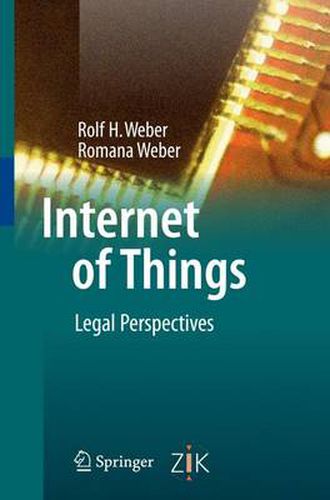Readings Newsletter
Become a Readings Member to make your shopping experience even easier.
Sign in or sign up for free!
You’re not far away from qualifying for FREE standard shipping within Australia
You’ve qualified for FREE standard shipping within Australia
The cart is loading…






This title is printed to order. This book may have been self-published. If so, we cannot guarantee the quality of the content. In the main most books will have gone through the editing process however some may not. We therefore suggest that you be aware of this before ordering this book. If in doubt check either the author or publisher’s details as we are unable to accept any returns unless they are faulty. Please contact us if you have any questions.
The Internet of Things as an emerging global Internet-based information archit- ture facilitating the exchange of goods and services is gradually developing. While the technology of the Internet of Things is still being discussed and created, the legal framework should be established before the Internet of Things is fully operable, in order to allow for an efective introduction of the new information architecture. If a self-regulatory approach is to be adopted to provide a legal framework for the Internet of Things, and this seems preferable, rulemakers can draw on experiences from the current regime of Internet governance. In the near future, mainly businesses will operate in the Internet of Things. Civil society is only expected to make use of the Internet of Things, as it now does of the Internet, at a later stage (e.g. for healthcare). The Internet of Things will have an impact in various areas. The regulatory fra- work must provide for provisions ensuring the security of the structure as well as the privacy of its users. Furthermore, legal barriers that may stand in the way of the coming into operation of the Internet of Things will have to be considered. However, the Internet of Things will also have positive efects in diferent felds, such as the inclusion of developing countries in global trade, the use of search engines to the beneft of civil society, combating product counterfeiting, tackling environmental concerns, improving health conditions, securing food supply and monitoring compliance with labor standards.
$9.00 standard shipping within Australia
FREE standard shipping within Australia for orders over $100.00
Express & International shipping calculated at checkout
This title is printed to order. This book may have been self-published. If so, we cannot guarantee the quality of the content. In the main most books will have gone through the editing process however some may not. We therefore suggest that you be aware of this before ordering this book. If in doubt check either the author or publisher’s details as we are unable to accept any returns unless they are faulty. Please contact us if you have any questions.
The Internet of Things as an emerging global Internet-based information archit- ture facilitating the exchange of goods and services is gradually developing. While the technology of the Internet of Things is still being discussed and created, the legal framework should be established before the Internet of Things is fully operable, in order to allow for an efective introduction of the new information architecture. If a self-regulatory approach is to be adopted to provide a legal framework for the Internet of Things, and this seems preferable, rulemakers can draw on experiences from the current regime of Internet governance. In the near future, mainly businesses will operate in the Internet of Things. Civil society is only expected to make use of the Internet of Things, as it now does of the Internet, at a later stage (e.g. for healthcare). The Internet of Things will have an impact in various areas. The regulatory fra- work must provide for provisions ensuring the security of the structure as well as the privacy of its users. Furthermore, legal barriers that may stand in the way of the coming into operation of the Internet of Things will have to be considered. However, the Internet of Things will also have positive efects in diferent felds, such as the inclusion of developing countries in global trade, the use of search engines to the beneft of civil society, combating product counterfeiting, tackling environmental concerns, improving health conditions, securing food supply and monitoring compliance with labor standards.